The Vampire Armand tvc-6 Read online
Page 2
"Go away," I said. I felt no anger, only the honest wish to have my thoughts unread and my emotions left alone.
With remarkable self-possession he ignored me, then said:
"Yes, I am afraid of you, a little, but then terribly curious too."
"Oh, I see, so that excuses it, that you followed me here?"
"I didn't follow you, Armand," he said. "I live here."
"Ah, I'm sorry then," I admitted. "I hadn't known. I suppose I'm glad of it. You guard him. He's never alone." I meant Lestat of course.
"Everyone's afraid of you," he said calmly. He had taken up a position only a few feet away, casually folding his arms. "You knowA, it's quite a study, the lore and habits of the vampires."
"Not to me, "I said.
"Yes, I realize that," he said. "I was only musing, and I hope you'll forgive me. It was about the child in the attic, the child they said was murdered. It's a tall story, about a very small little person. Maybe if your luck is better than that of everyone else, you'll see the ghost of the child whose clothes were shut up in the wall."
"Do you mind if I look at you?" I said. "I mean if you're going to dip your beak into my mind with such abandon? We met some time ago before all this happened-Lestat, the Heavenly Journey, this place. I never really took stock of you. I was indifferent, or too polite, I don't know which."
I was surprised to hear such heat in my voice. I was volatile, and it wasn't David Talbot's fault.
"I'm thinking of the conventional knowledge about you," I said. "That you weren't born in this body, that you were an elderly man when Lestat knew you, that this body you inhabit now belonged to a clever soul who could hop from living being to living being, and there set up shop with his own trespassing soul."
He gave me a rather disarming smile.
"So Lestat said," he answered. "So Lestat wrote. It's true, of course. You know it is. You've known since you saw me before."
"Three nights we spent together," I said. "And I never really questioned you. I mean I never really even looked directly into your eyes."
"We were thinking of Lestat then."
"Aren't we now?"
"I don't know," he said.
"David Talbot," I said, measuring him coldly with my eyes, "David Talbot, Superior General of the Order of Psychic Detectives known as the Talamasca, had been catapulted into the body in which he now walks." I didn't know whether I paraphrased or made it up as I went along. "He'd been entrenched or chained inside it, made a prisoner by so many ropey veins, and then tricked into a vampire as a fiery unstanchable blood invaded his lucky anatomy, sealing his soul up in it as it transformed him into an immortal-a man of dark bronzed skin and dry, lustrous and thick black hair."
"I think you have it right," he said with indulgent politeness.
"A handsome gent," I went on, "the color of caramel, moving with such catlike ease and gilded glances that he makes me think of all things once delectable, and now a potpourri of scent: cinnamon, clove, mild peppers and other spices golden, brown or red, whose fragrances can spike my brain and plunge me into erotic yearnings that live now, more than ever, to play themselves out. His skin must smell like cashew nuts and thick almond creams. It does."
He laughed. "I get your point."
I had shocked myself. I was wretched for a moment. "I'm not sure I get myself," I said apologetically.
"I think it's plain," he said. "You want me to leave you alone."
I saw the preposterous contradictions in all this at once.
"Look," I whispered quickly. "I'm deranged," I whispered. "My senses cross, like so many threads to make a knot: taste, see, smell, feel. I'm rampant."
I wondered idly and viciously if I could attack him, take him, bring him down under my greater craft and cunning and taste his blood without his consent.
"I'm much too far along the road for that," he said, "and why would you chance such a thing?"
What self-possession. The older man in him did indeed command the sturdier younger flesh, the wise mortal with an iron authority over all things eternal and supernaturally powerful. What a blend of energies! Nice to drink his blood, to take him against his will. There is no such fun on Earth like the raping of an equal.
"I don't know," I said, ashamed. Rape is unmanly. "I don't know why I insult you. You know, I wanted to leave quickly. I mean I wanted to visit the attic, and then be out of here. I wanted to avoid this sort of infatuation. You are a wonder, and you think me a wonder, and it's rich."
I let my eyes pass over him. I'd been blind to him when we met last, that was most true.
He dressed to kill. With the cleverness of olden times, when men could preen like peacocks, he'd chosen golden sepia and umber colors for his clothes. He was smart and clean and fretted all over with careful bits of pure gold, in a wristband timepiece and buttons and a slender pin for his modern tie, that tailored spill of color men wear in this age, as if to let us grab them all the more easily by its noose. Stupid ornament. Even his shirt of polished cotton was tawny and full of something of the sun and the warmed earth. Even his shoes were brown, glossy as beetles' backs.
He came towards me.
"You know what I'm going to ask," he said. "Don't wrestle with these unarticulated thoughts, these new experiences, all this overwhelming understanding. Make a book out of it for me."
I couldn't have predicted that this would be his question. I was surprised, sweetly so, but nevertheless taken off guard.
"Make a book? I? Armand?"
I went towards him, turned sharply and fled up the steps to the attic, skirting the third floor and then entering the fourth.
The air was thick and warm here. It was a place daily baked by the sun. All was dry and sweet, the wood like incense and the floors splintery.
"Little girl, where are you?" I asked.
"Child, you mean," he said.
He had come up behind me, taking a bit of time for courtesy's sake.
He added, "She was never here."
"How do you know?"
"If she were a ghost, I could call her," he said.
I looked over my shoulder. "You have that power? Or is this just what you want to say to me right now? Before you venture further, let me warn you that we almost never have the power to see spirits."
"I'm altogether new," David said. "I'm unlike any others. I've come into the Dark World with different faculties. Dare I say, we, our species, vampires, have evolved?"
"The conventional word is stupid," I said. I moved further into the attic. I spied a small chamber with plaster and peeling roses, big floppy prettily drawn Victorian roses with pale fuzzy green leaves. I went into the chamber. Light came from a high window out of which a child could not have seen. Merciless, I thought.
"Who said that a child died here?" I said. All was clean beneath the soil of years. There was no presence. It seemed perfect and just, no ghost to comfort me. Why should a ghost come from some savory rest for my sake?
So I could cuddle up perhaps to the memory of her, her tender legend.
How are children murdered in orphanages where only nuns attend? I never thought of women as so cruel. Dried up, without imagination perhaps, but not aggressive as we are, to kill.
I turned round and round. Wooden lockers lined one wall, and one locker stood open, and there the tumbled shoes were, little brown Oxfords, as they called them, with black strings, and now I beheld, where it had been behind me, the broken and frayed hole from which they'd ripped her clothes. All fallen there, moldy and wrinkled they lay, her clothes.
A stillness settled on me as if the dust of this place were a fine ice, coming down from the high peaks of haughty and monstrously selfish mountains to freeze all living things, this ice, to close up and stop forever all that breathed or felt or dreamed or lived.
He spoke in poetry:
" Tear no more the heat of the sun,' " he whispered. "Nor the furious winter's rages. Fear no more ...' "
I winced with pleasure. I knew the verses.
I loved them.
I genuflected, as if before the Sacrament, and touched her clothes. "And she was little, no more than five, and she didn't die here at all.
No one killed her. Nothing so special for her."
"How your words belie your thoughts," he said.
"Not so, I think of two things simultaneously. There's a distinction in being murdered. I was murdered. Oh, not by Marius, as you might think, but by others."
I knew I spoke soft and in an assuming way, because this wasn't meant for pure drama.
"I'm trimmed in memories as if in old furs. I lift my arm and the sleeve of memory covers it. I look around and see other times. But you know what frightens me the most-it is that this state, like so many others with me, will prove the verge of nothing but extend itself over centuries."
"What do you really fear? What did you want from Lestat when you came here?"
"David, I came to see him. I came to find out how it was with him, and why he lies there, unmoving. I came-." I wasn't going to say any more.
His glossy nails made his hands look ornamental and special, cares- sive, comely and lovely with which to be touched. He picked up a small dress, torn, gray, spotted with bits of mean lace. Everything dressed in flesh can yield a dizzying beauty if you concentrate on it long enough, and his beauty leapt out without apology.
"Just clothes." Flowered cotton, a bit of velvet with a puffed sleeve no bigger than an apple for the century of bare arms by day and night. "No violence at all surrounding her," he said as if it were a pity.
"Just a poor child, don't you think, and sad by nature as well as circumstance."
"And why were they walled up, tell me that! What sin did these little dresses commit?" I sighed. "Good God, David Talbot, why don't we let the little girl have her romance, her fame? You make me angry. You say you can see ghosts. You find them pleasant? You like to talk with them. I could tell you about a ghost-."
"When will you tell me? Look, don't you see the trick of a book?" He stood up, and dusted off his knee with his right hand. In his left was her gathered dress. Something about the whole configuration bothered me, a tall creature holding a little girl's crumpled dress.
"You know, when you think of it," I said, turning away, so I wouldn't see the dress in his hand, "there's no good reason under God for little girls and little boys. Think of it, the other tender issue of mammals. Among puppies or kitten or colts, does one find gender? It's never an issue. The half-grown fragile thing is sexless. There is no determination. There is nothing as splendid to look at as a little boy or girl. My head is so full of notions. I rather think I'll explode if I don't do something, and you say make a book for you. You think it's possible, you think... "
"What I think is that when you make a book, you tell the tale as you would like to know it!" "I see no great wisdom in that."
"Well, then think, for most speech is a mere issue of our feelings, a mere explosion. Listen, note the way that you make these outbursts."
"I don't want to."
"But you do, but they are not the words you want to read. When you write, something different happens. You make a tale, no matter how fragmented or experimental or how disregarding of all conventional and helpful forms. Try this for me. No, no, I have a better idea."
"What?"
"Come down with me into my rooms. I live here now, I told you.
Through my windows you can see the trees. I don't live like our friend Louis, wandering from dusty corner to dusty corner, and then back to his flat in the Rue Royale when he's convinced himself once more and for the thousandth time that no one can harm Lestat. I have warm rooms. I use candles for old light. Come down and let me write it, your story. Talk to me. Pace, and rant if you will, or rail, yes, rail, and let me write it, and even so, the very fact that I write, this in itself will make you make a form out of it. You'll begin to ..."
"What?"
"To tell me what happened. How you died and how you lived."
"Expect no miracles, perplexing scholar. I didn't die in New York that morning. I almost died."
He had me faintly curious, but I could never do what he wanted. Nevertheless he was honest, amazingly so, as far as I could measure, and therefore sincere.
"Ah, so, I didn't mean literally I meant that you should tell me what it was like to climb so high into the sun, and suffer so much, and, as you said, to discover in your pain all these memories, these connecting links. Tell me! Tell me."
"Not if you mean to make it coherent," I said crossly. I gauged his reaction. I wasn't bothering him. He wanted to talk more.
"Make it coherent? Armand, I'll simply write down what you say." He made his words simple yet curiously passionate.
"Promise?"
I flashed on him a playful look. Me! To do that.
He smiled. He wadded up the little dress and then dropped it carefully so it might fall in the middle of the pile of her old clothes.
"I'll not alter one syllable," he said. "Come be with me, and talk to me, and be my love." Again, he smiled.
Suddenly he came towards me, much in the aggressive manner in which I'd thought earlier to approach him. He slipped his hands under my hair, and felt of my face, and then he gathered up the hair and he put his face down into my curls, and he laughed. He kissed my cheek.
"Your hair's like something spun from amber, as if the amber would melt and could be drawn from candle flames in long fine airy threads and let to dry that way to make all these shining tresses. You're sweet, boylike and pretty as a girl. I wish I had one glimpse of you in antique velvet the way you were for him, for Marius. I wish I could see for one moment how it was when you dressed in stockings and wore a belted doublet sewn with rubies. Look at you, the frosty child. My love doesn't even touch you."
This wasn't true.
His lips were hot, and I could feel the fangs under them, feel the urgency suddenly in his fingers pressing against my scalp. It sent the shivers through me, and my body tensed and then shuddered, and it was sweet beyond prediction. I resented this lonely intimacy, resented it enough to transform it, or rid myself of it utterly. I'd rather die or be away, in the dark, simple and lonely with common tears.
From the look in his eyes, I thought he could love without giving anything. Not a connoisseur, just a blood drinker.
"You make me hungry," I whispered. "Not for you but for one who is doomed and yet alive. I want to hunt. Stop it. Why do you touch me? Why be so gentle?"
"Everyone wants you," he said.
"Oh, I know. Everyone would ravage a guilty cunning child! Everyone would have a laughing boy who knows his way around the block. Kids make better food than women, and girls are all too much like women, but young boys? They're not like men, are they?"
"Don't mock me. I meant I wanted only to touch you, to feel how soft you are, how eternally young."
"Oh, that's me, eternally young," I said. "You speak nonsense words for one so pretty yourself. I'm going out. I have to feed. And when I've finished with that, when I'm fiill and hot, then I'll come and I'll talk to you and tell you anything you want." I stepped back just a little from him, feeling the quivers through me as his fingers released my hair. I looked at the empty white window, peering too high for the trees.
"They could see nothing green here, and it's spring outside, southern spring. I can smell it through the walls. I want to look just for a moment on flowers. To kill, to drink blood and to have flowers."
"Not good enough. Want to make the book," he said. "Want to make it now and want you to come with me. I won't hang around forever."
"Oh, nonsense, of course you will. You think I'm a doll, don't you? You think I'm cute and made of poured wax, and you'll stay as long as I stay."
"You're a bit mean, Armand. You look like an angel, and talk like a common thug."
"Such arrogance! I thought you wanted me."
"Only on certain terms."
"You lie, David Talbot," I said.
I headed past him for the stairs. Cicadas
sang in the night as they often do, to no clock, in New Orleans.
Through the nine-pane windows of the stairwell, I glimpsed the flowering trees of spring, a bit of vine curling on a porch top.
He followed. Down and down we went, walking like regular men, down to the first floor, and out the sparkling glass doors and into the broad lighted space of Napoleon Avenue with its damp, sweet park of green down the middle, a park thick with carefully planted flowers and old gnarled and humble, bending trees.
The whole picture moved with the subtle river winds, and wet mist swirled but would not fall into rain itself, and tiny green leaves drifted down like wilting ashes to the ground. Soft soft southern spring. Even the sky seemed pregnant with the season, lowering yet blushing with reflected light, giving birth to the mist from all its pores.
Strident perfume rose from the gardens right and left, from purple Four O'Clocks, as mortals call them here, a rampant flower like unto weed, but infinitely sweet, and the wild irises stabbing upwards like blades out of the black mud, throaty petals monstrously big, battering themselves on old walls and concrete steps, and then as always there were roses, roses of old women and roses of the young, roses too whole for the tropical night, roses coated with poison.
There had been streetcars here once on this center strip of grass. I knew it, that the tracks had run along this wide deep green space where I walked ahead of him, slumward, riverward, deathward, Woodward. He came after me. I could close my eyes as I walked, never losing a step, and see the streetcars.
"Come on, follow me," I said, describing what he did, not inviting him.
Blocks and blocks within seconds. He kept up. Very strong. The blood of an entire Royal Vampire court was inside him, no doubt of it. Count on Lestat to make the most lethal of monsters, that is, after his initial seductive blunders-Nicolas, Louis, Claudia-not a single one of the three able to take care of themselves alone, and two perished, and one lingering and perhaps the weakest vampire yet walking in the great world.
I looked back. His tight, polished brown face startled me. He looked lacquered all over, waxed, buffed, and once again I thought of spicy things, of the meat of candied nuts, and delicious aromas, of chocolates sweet with sugar and dark rich butterscotch, and it seemed a good thing suddenly to maybe grab ahold of him.

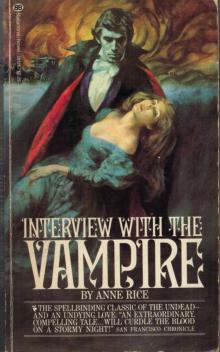 Interview with the Vampire
Interview with the Vampire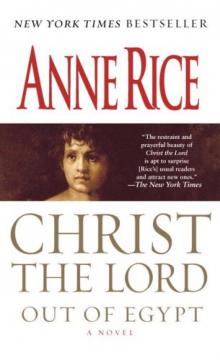 Christ the Lord: Out of Egypt
Christ the Lord: Out of Egypt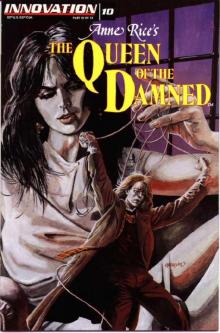 The Queen Of The Damned
The Queen Of The Damned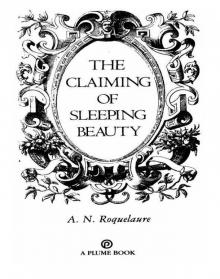 The Claiming of Sleeping Beauty
The Claiming of Sleeping Beauty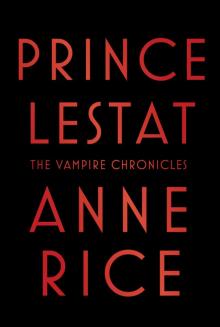 Prince Lestat
Prince Lestat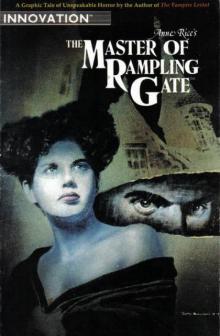 The Master of Rampling Gate
The Master of Rampling Gate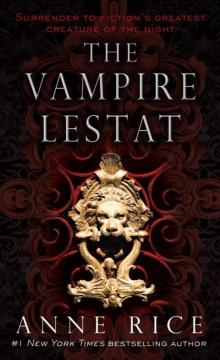 The Vampire Lestat
The Vampire Lestat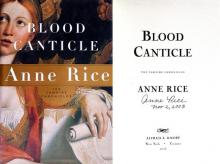 Blood Canticle
Blood Canticle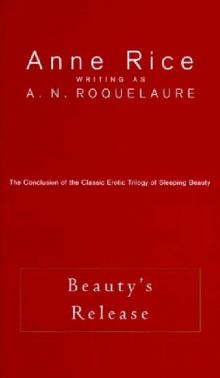 Beauty's Release
Beauty's Release Pandora
Pandora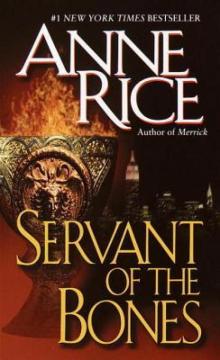 Servant of the Bones
Servant of the Bones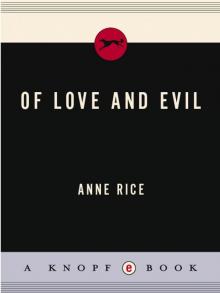 Of Love and Evil
Of Love and Evil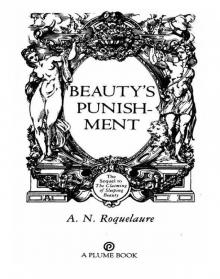 Beauty's Punishment
Beauty's Punishment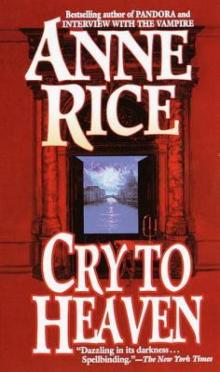 Cry to Heaven
Cry to Heaven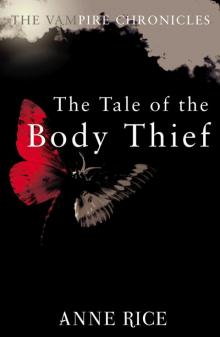 The Tale of the Body Thief
The Tale of the Body Thief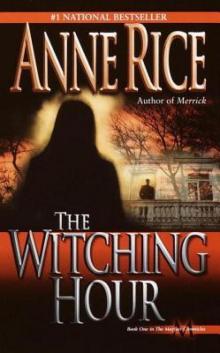 The Witching Hour
The Witching Hour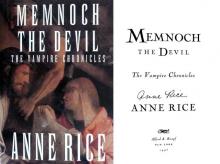 Memnoch the Devil
Memnoch the Devil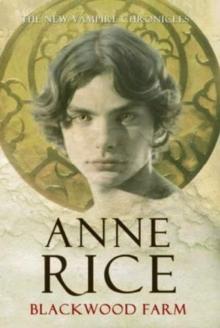 Blackwood Farm
Blackwood Farm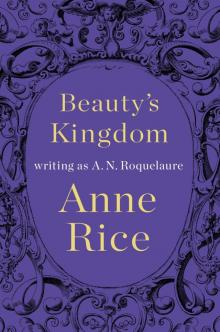 Beauty's Kingdom
Beauty's Kingdom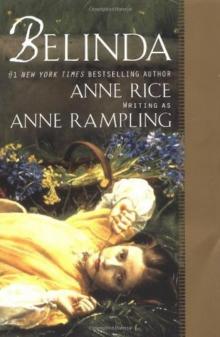 Belinda
Belinda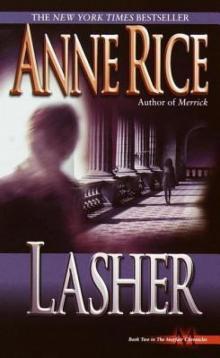 Lasher
Lasher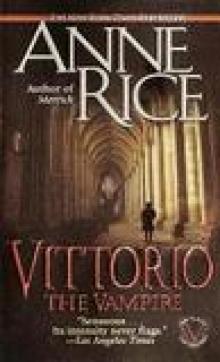 Vittorio, the Vampire
Vittorio, the Vampire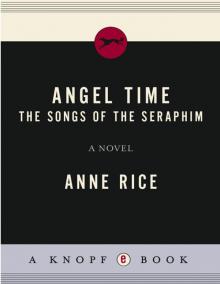 Angel Time
Angel Time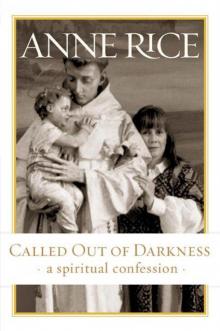 Called Out of Darkness: A Spiritual Confession
Called Out of Darkness: A Spiritual Confession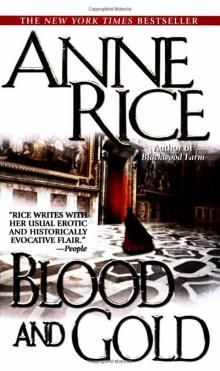 Blood And Gold
Blood And Gold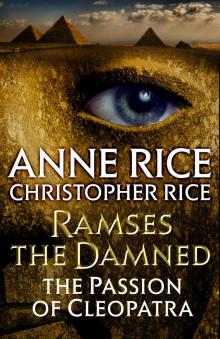 The Passion of Cleopatra
The Passion of Cleopatra Taltos
Taltos Exit to Eden
Exit to Eden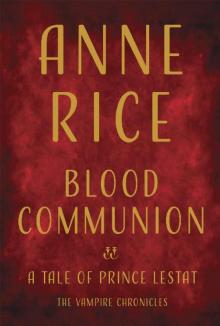 Blood Communion (The Vampire Chronicles #13)
Blood Communion (The Vampire Chronicles #13)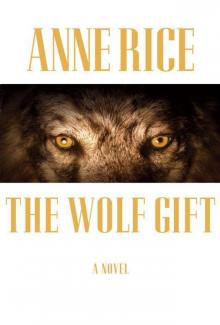 The Wolf Gift
The Wolf Gift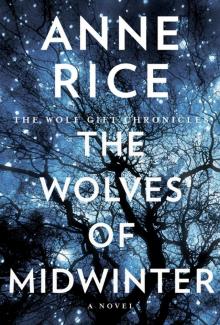 The Wolves of Midwinter
The Wolves of Midwinter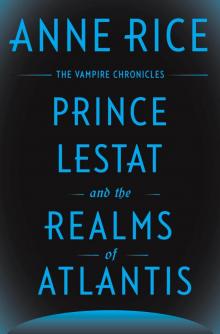 Prince Lestat and the Realms of Atlantis
Prince Lestat and the Realms of Atlantis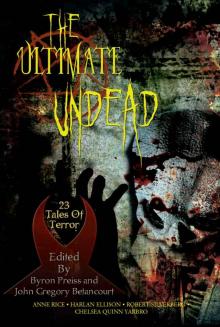 The Ultimate Undead
The Ultimate Undead The Vampire Lestat tvc-2
The Vampire Lestat tvc-2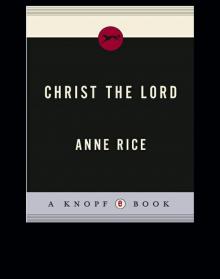 The Road to Cana
The Road to Cana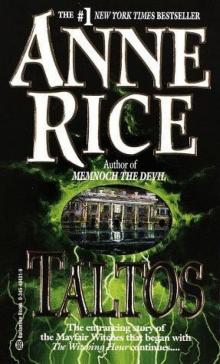 Taltos lotmw-3
Taltos lotmw-3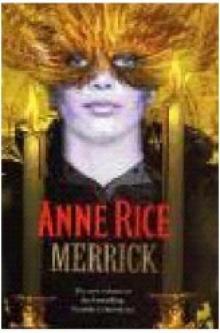 Merrick tvc-7
Merrick tvc-7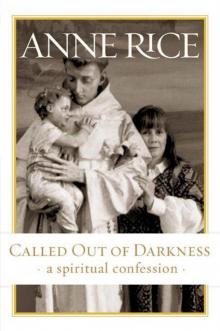 Called Out of Darkness
Called Out of Darkness Pandora - New Vampires 01
Pandora - New Vampires 01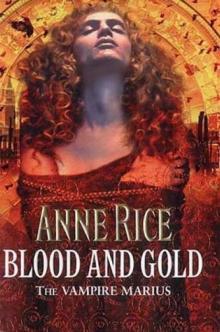 Bllod and Gold
Bllod and Gold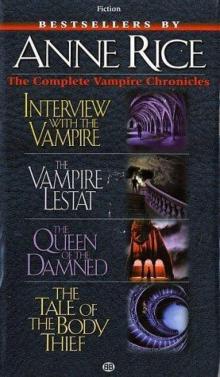 The Queen Of the Damned: Vampire Chronicles
The Queen Of the Damned: Vampire Chronicles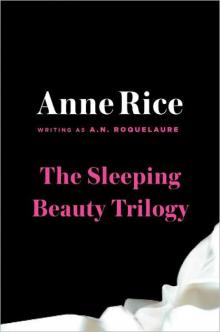 The Sleeping Beauty Trilogy
The Sleeping Beauty Trilogy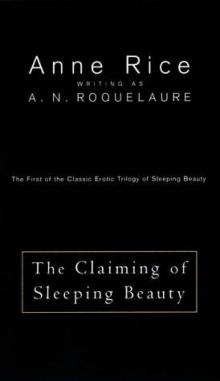 The Claiming of Sleeping Beauty b-1
The Claiming of Sleeping Beauty b-1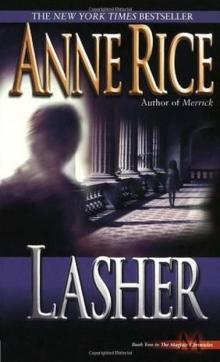 Lasher lotmw-2
Lasher lotmw-2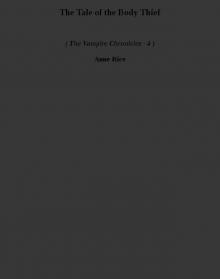 The Tale of the Body Thief tvc-4
The Tale of the Body Thief tvc-4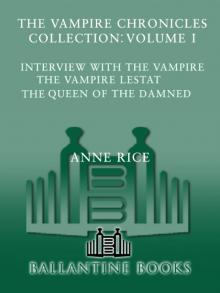 The Vampire Chronicles Collection
The Vampire Chronicles Collection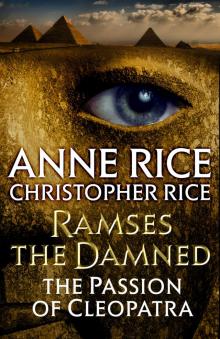 Ramses the Damned
Ramses the Damned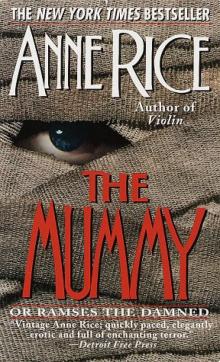 The Mummy - or Ramses the Damned
The Mummy - or Ramses the Damned Vittorio, The Vampire - New Vampires 02
Vittorio, The Vampire - New Vampires 02 The Vampire Armand tvc-6
The Vampire Armand tvc-6 Queen of the Damned tvc-3
Queen of the Damned tvc-3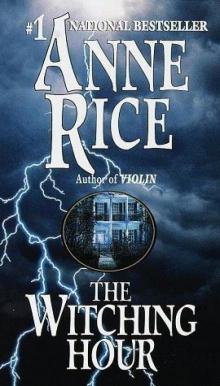 The witching hour lotmw-1
The witching hour lotmw-1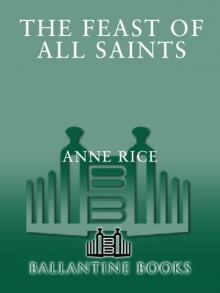 Feast of All Saints
Feast of All Saints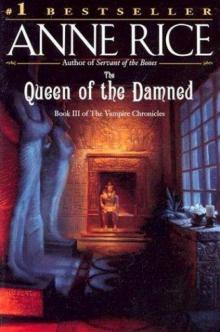 Queen of the Damned
Queen of the Damned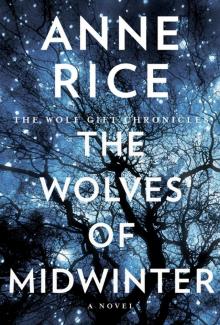 The Wolves of Midwinter twgc-2
The Wolves of Midwinter twgc-2 The Mummy
The Mummy Blood and Gold tvc-8
Blood and Gold tvc-8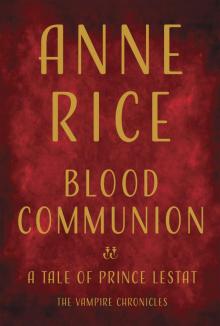 Blood Communion
Blood Communion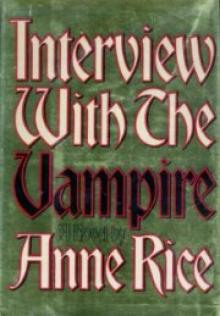 Interview with the Vampire tvc-1
Interview with the Vampire tvc-1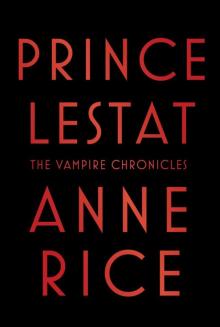 Prince Lestat: The Vampire Chronicles
Prince Lestat: The Vampire Chronicles